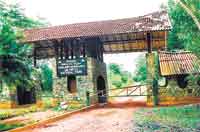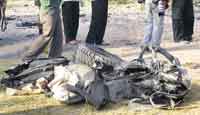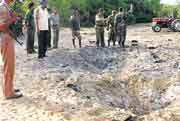|
|
||||||||||||
| Never in their wildest dreams Unable to come to terms with the unexpected tragedy, friends and loved ones of the nature-lovers whose lives were blasted at Wilpattu ask – why? Death was the price they paid for their love of wildlife. When the group of friends left Colombo on Friday, to embark on a safari at the Wilpattu National Park, close to Anuradhapura, they were not to know that this was to be their last journey.
Here, amidst the rugged beauty of the jungle they became unwitting victims of a cruel weapon of war, dying in the early hours of May 27, in a landmine explosion that hit the jeep they were travelling in across the park.
The mangled bodies of Nihal de Silva, Darrel Perera, Chandi and Anula Asirwatham, Nandana and Henrietta Abeysuriya and tracker Anura Dissanayake were discovered several hours later by a second group of visitors to the park who were on their way to the Kokkumootte river for a bath. The shocked and grieving loved ones of those killed, struggle to come to terms with this terrible tragedy. They were parents, sisters, brothers, friends -- much loved and respected members of their community. How was it that these precious lives were taken away so cruelly?
“It was the worst day of my life…….seeing all my friends dead. We grew up together,” said Vajira Wijayawardena who had known some of them for over four decades, having been to school with them. Vajira, a businessman, was a close friend of all three families and belonged to the same circle that met each Friday for a chat. In fact he was supposed to go on the trip with them and had his bags packed, but had to stay behind because of an urgent business matter. Although two members of the group had been to Wilpattu earlier, it was the first time for the rest and Darrel Perera had made the booking at the bungalow located in a beautiful setting. “As a group we enjoyed getting away from it all, relaxing and being close to nature,” said Vajira, who normally drove one of the vehicles on such trips. As he was not going with them, the group had taken along Darrel’s driver and a helper. At the park gate, just minutes before entering, Darrel had called Vajira. “Why don’t you finish your work and come today or tomorrow?” he had asked. Apparently there was no mobile signal within the park and they had given him the park office number to call, should he decide to come so that they could meet him at the gate. The bungalow is 54 kms away, at the other end of the park and it takes over one and a half hours to get there from the entrance. The park office communicates with those in the bungalow by sending a radio message. Vajira did go to Wilpattu at about three in the afternoon on Sunday, May 28. But it was not to join them on safari but for a heart-rending task. “I and two family members of the deceased had to identify the bodies,” Vajira says, pausing to control his emotions. Their remains had been brought to the Wilpattu gate only about 9.30 p.m. on Sunday.
Vajira and the two others had also been given the IDs and belongings of the deceased, among which was a box with personal items. “One lady’s watch had stopped at 6.10 a.m. on Saturday,” he said. Nihal de Silva, the renowned author of The Road from Elephant Pass which won the Gratiaen Prize in 2003, is remembered by his loved ones as the guiding force in his family. Known for his wonderful sense of humour and loving personality, he was the one they looked to when it came to making decisions in any crisis. Formerly the proprietor of Water Mart Pvt. Ltd., Mr. de Silva used to describe himself as a “writer by accident”. After he handed over the enterprise to his sons, he turned to writing to keep himself occupied; becoming a literary success. Many of his books such as The Far Spent Day and the Ginirella Conspiracy reflect his love of wildlife. Not only children, but also adults enjoyed his series of stories 'Paduma's World', which appeared weekly in the Funday Times. At the time of his death, he was working on his fifth book. A childhood friend of Anula Asirwatham sharing his thoughts about her and her husband, Chandi, both of whom went on the ill-fated trip, said Chandi was a ruggerite who played for S. Thomas’ College, Mount Lavinia and CR & FC as a scrum-half. Career-wise he dabbled in automobile engineering, garment manufacturing and educational toys. Chandi’s wife Anula, although initially a homemaker, subsequently kept herself occupied running a catering business. “They were warm and friendly,” he reminisces. Rajkumari Amarasekera (Ungi) had known Darrel Perera and the others in the group for almost ten years. Darrel’s wife, Marina, and Rajkumari had been school friends. The fun-loving bunch would meet up at the 20th Century Club (now closed) almost every week. Come long weekends, they would go on trips to Yala, Nuwara Eliya, Weligama etc., or be at each other’s parties. “We would have been on this trip too had my husband recovered from his health problem,” she says. They had last met on April 30 at the Golf Club for Rajkumari’s birthday. “Darrel was a philanthropist and also generous host who entertained in style,” Rajkumari recalls. He has helped many unfortunate people who needed assistance. “His love of life and of people was remarkable,” she adds. It was just a short life together for Nandana and Henrietta Abeysuriya who married only last September. The Chairman of Expo Coffee Ltd., Nandana until recently was the Joint Managing Director of Nisol Corrugated Cartons Ltd. “He was a good man and he loved wildlife,” said Aloma Abeysuriya, his ex-wife. Anura Dissanayake, 43, was an experienced volunteer tracker, who lived only about 2 kms from the park. As destiny would have it, it was he who accompanied the ill-fated group that morning. His young son and daughter were to wait in vain for his return that day. “He was a good and honest worker,” an official at the Wilpattu Park said. The loved ones of those involved in the tragedy
wonder -- Why do bad things happen to good people? Were they simply
at the wrong place at the wrong time? Whatever explanations are
offered, the pain, the anguish and the sense of unfairness cannot
be taken away.
|
||||||||||||
Copyright © 2006 Wijeya Newspapers
Ltd. All rights reserved. |



